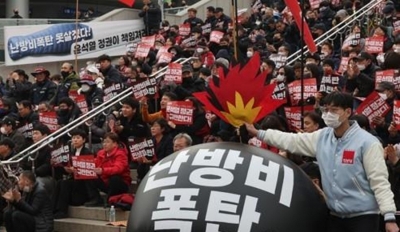Seoul, April 23 : A month after the postponement of a decision on the second-quarter electricity rates, South Korea is still struggling with when and how much to raise utility bills due to high inflation and political burdens amid high global energy prices and the snowballing losses of state utility firms, analysts said on Sunday.
Late last month, the industry ministry and the ruling People Power Party (PPP) decided to put off the planned announcement of the electricity rates for the April-June period, saying that they shared the need for the hikes but more time is needed “to review related circumstances”, Yonhap news agency reported.
The government and the party held another consultation session on Thursday, but failed to draw any conclusion.
Any announcement of the potential adjustment is unlikely to be made this month, as the government “is still listening to opinions from various stakeholders,” a ministry official was quoted as saying the news agency.
President Yoon Suk Yeol’s planned visit to the US this week seems another factor that delays the decision, as the industry minister, the head of the state-run Korea Electric Power Corp.(KEPCO) and other senior officials involved in energy policy are to accompany Yoon, he added.
The ministry and KEPCO said an increase in the electricity and gas rates is inevitable.
Last year, the price at which KEPCO bought electricity stood at 155.5 won ($0.12) per kilowatt hour (kWh), but the unit price of sales was 120.51 won due to limited rate hikes amid soaring inflation and economic difficulties over the Covid-19 pandemic and a global economic slowdown.
KEPCO accordingly suffered a record operating loss of 32.63 trillion won in 2022, more than quadruple from a year earlier.
For the first quarter of this year, the government raised the rates by 13.1 won per kWh, the sharpest gain in about four decades, but it was far from enough to resolve the problem.KEPCO was forecast to report more than 5 trillion won in losses during the first three months of this year.
The Korea Gas Corp.also had about 8.6 trillion won in uncollected payments as of end-2022.
But Yoon said in February that the government plans to freeze public utility fees in the first half of this year to help ease people’s economic burdens in response to public outcries over spikes in heating and energy bills during the winter.
“Rate hikes would negatively affect Yoon’s approval rating, as well as the ruling party, as the 2024 general election is about a year away,” a ruling party official said.”KEPCO should do what it has to do first before seeking the hikes.”
In a report submitted to the National Assembly, KEPCO called for a 51.6 won rate increase this year.
KEPCO has promised a series of self-rescue measures, including the restructuring of overseas businesses, property sales and other cost-cutting moves.
It also vowed to come up with additional stronger measures to cut personnel expenses, revamp the organization and extend support for vulnerable groups.
Some experts call for prioritising market principles as the worsening financial status of public energy companies could hurt the basis of the country’s stable energy supply.
“Political considerations appear to have prevented the government from properly reflecting soaring costs in the selling price.In-depth discussions are needed among experts, utility firms and consumers through an independent body to draw a reasonable result at an early date,” Kang Seung-jin, a professor at the Tech University of Korea, said.
Global liquefied natural gas prices more than doubled on-year to 1,564.8 won per ton last year, and the price of soft coal spiked to $359 per ton in 2022 from $139.10 a year earlier, according to government data.
Over the period, KEPCO has sharply increased bond sales, and the National Assembly passed a revision late last year to raise the ceiling of its bond issuance to prevent a liquidity crisis.
But the move has caused concerns about potential negative impacts on the domestic bond market.
In the first quarter alone, KEPCO issued bonds worth over 8 trillion won.
int/sha
#SKorea #double #bind #Seoul #Covid-19 #Review







